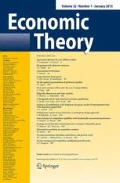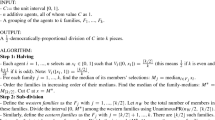Abstract
We consider a finite society with of individuals distributed along the real line. The individuals form jurisdictions to consume public projects, equally share their costs and, in addition, bear a transportation cost to the location of the project. We examine a core and Nash notions of stable jurisdiction structures and show that in hedonic games both solution sets could be empty. We demonstrate that in a quasi-hedonic set-up there is a Nash stable partition, but, in general, there are no core stable partitions. We then examine a subclass of societies that admits the existence of both types of stable partitions.
Similar content being viewed by others
References
Alesina A., Spolaore E. (1997) On the number and size of nations. Q J Econ 112, 1027–1056
Aumann R.J., Drèze J.H. (1974) Cooperative games with coalition structure. Int J Game Theory 3, 217–237
Banerjee S., Konishi H., Sönmez T. (2001) Core in a simple coalition formation game. Soc Choice Welf 18, 135–153
Bogomolnaia A., Jackson M.O. (2002) The stability of hedonic coalition structures. Games Econ Behav 18, 201–230
Brams S.J., Jones M.A., Kilgour D.M. (2002) Single-peakedness and disconnected coalitions. J Theor Polit 14, 359–383
Cassela A. (2001) The role of market size in the formation of jurisdictions. Rev Econ Stud 68, 83–108
Drèze, J.H., Le Breton, M., Weber, S.: Rawlsian pricing of access to public facilities: a unidimensional illustration. J Econ Theory (forthcoming) (2006)
Greenberg J., Weber S. (1985) Multiparty equilibrium under proportional representation. Amer Polit Sci Rev 79, 693–703
Greenberg J., Weber S. (1986) Strong Tiebout equilibrium under restricted preferences domain. J Econ Theory 38, 101–117
Jehiel P., Scotchmer S. (1997) Free mobility and the optimal number of jurisdictions. Ann Econ Stat 45, 219–231
Jehiel P., Scotchmer S. (2001) Constitutional rules of exclusion in jurisdiction formation. Rev Econ Stud 68, 393–413
Haimanko O., Le Breton M., Weber S. (2004) Voluntary formation of communities for provision of public projects. J Econ Theory 115, 1–34
Haimanko O., Le Breton M., Weber S. (2005) Transfers in a polarized country: bridging the gap between efficiency and stability. J Public Econ 89, 1277–1303
Konishi H., Le Breton M., Weber S. (1997) Pure strategy Nash equilibrium in a group formation game with positive externalities. Games Econ Behav 21, 161–182
Konishi H., Le Breton M., Weber S. (1998) Equilibrium in a finite local public good economy. J Econ Theory 79, 224–244
Le Breton M., Weber S. (2004) The art of making everybody happy: how to prevent a secession. IMF Staff Papers 50, 403–435
Le Breton M., Weber S. (2004) Secession-proof cost allocations and stable group structures in models of horizontal differentiation. In: Demange G., Wooders M. (eds) Group formation in economics: networks, clubs and coalitions. Cambridge, Cambridge University Press, pp. 266–285
Mas-Collel A. (1980) Efficiency and decentralization in the pure theory of public goods. Q J Econ 94, 625–641
Monderer D., Shapley L.S. (1996) Potential games. Games Econ Behav 14, 124–143
Rosenthal R.W. (1973) A class of games possessing pure-strategy Nash equilibrium. Int J Game Theory 2, 65–67
Author information
Authors and Affiliations
Corresponding author
Additional information
We wish to thank an anonymous referee for useful comments.
Financial support through grants R98-0631 from the Economic Education and Research Consortium, # NSh-1939.2003.6 School Support, Russian Foundation for Basic Research No. 04-02-17227, and the Russian Science Support Foundation is gratefully acknowledged.
Rights and permissions
About this article
Cite this article
Bogomolnaia, A., Le Breton, M., Savvateev, A. et al. Stability of jurisdiction structures under the equal share and median rules. Economic Theory 34, 525–543 (2008). https://doi.org/10.1007/s00199-006-0198-z
Received:
Revised:
Published:
Issue Date:
DOI: https://doi.org/10.1007/s00199-006-0198-z



